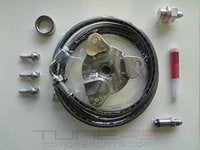Is failure of the IMS bearing inevitable in M96 and M97 Porsche engines?
Asked by Ken Jul 03, 2013 at 08:41 PM about the 2000 Porsche 911 Carrera Coupe RWD
Question type: Maintenance & Repair
The Intermediate shaft Bearing failure is a known issue and I'm considering the purchase of a 2000 911 Carrera 2 with 157,000 miles and no known engine repair to date.
I'm quite concerned about the possibility of a "silent" but nearly always fatal engine disruption in a car that exhibits no visible or audial sign of impending doom
27 Answers
157K miles is a lot on any car- in a 911 it is 20,000 laps around Le Mans- do you think it might need some service/repairs?!
The IMS bearing is all well known for failure, I would highly recommend a PPI ( Porsche Prepurchase Inspection ) They will check the whole car and I believe this includes the IMS and give a full report on the car. This PPI usaully cost around $150 but can save you hundreds if not thousands. That said there are plenty of P cars with high miles, as long as it has been maintained and has records of said maintenance that should also give you a piece of mind. There is a company that has redesigned the IMS and that is also an option to help prolong the life of you 911. I myself have been looking the boxster which also suffers from the same issue, Ive been read up over on the pelican parts forum theres tons of great info there. Good Luck and keep us informed.
It is not inevitable in most cars. That said, I'd do it anyway. The bearing itself can cost plenty. A single row ceramic is about $200 and a double row ceramic bearing is more than $300. That is just for the bearing (don't consider anything less than a ceramic bearing) you have to drop the transmission to install it, and you have to use Porsche specialized tools to do it correctly. While you're in there, you might as well consider a clutch if you think it needs it, and definitely do a rear main seal. This will probably set you back around $2000 if you do the clutch. It's worth the peace of mind.
I remembered seeing an oil feed IMS bearing heres a pic. This is what I would be using if I had to / wanted to replace it. Direct Oil Feed (DOF) for early style IMS Bearing (1997-2004 996/986 ).
IMS failure happens without a warning, and no matter what mileage, even at 15k miles! Certain years and models have faulty factory bearings, and they fail without a warning. The only thing you can do is prevent severe engine damage and high repair costs by replacing your IMS ahead of time. I know a place that sells IMS bearing upgrades for $400 free shipping: www.mbmotorsportsrepair.com. They specialize in Porsche engines and know everything about these cars. Give them a call if you have any questions. They have customers all over US, Canada, Europe, etc. Very good small shop with lots of happy customers (including me), other shops buy their engines too.
According to http://theimssolution.com/ims-101/, the single row bearings were phased in during 2000 so not all the 2000 models have them.
The failure happens usually. I would recommend to check the information on this site http://www.imsbearingsolution.com/. There is a good IMS bearing solution there.
The failure only occured in 5% of the vehicles, so it doesn't happen usually. There seems to be a decent amount of misinformation on this thread. The IMS tends to fail between 35k and 50k, and if this car has reached over 100,000 there is a very low chance of failure. That being said, installing an IMS alarm or doing an outright swap might be worth the cash. If it has the dual bearing, there is no need to do anything IMO
Porsche dealers I've contacted have all replied that they no longer do Pre-Purchase Inspections due to liability concerns. None would provide specifics as to their liability concerns. One even stated that no Porsche dealer does PPIs anymore. When asked if this had anything to do with the IMS/996/997 problem, all refused to comment.
Porsche dealer in north Atlanta told me they would do a PPI
Dealers will rip you off. Find a Porsche speed shop instead, especially if the car is an older model. They tend to do a better job because they are constantly updating cars, especially speed and handling mods.
IMS is a known issue and it may or may not fail in your car, I have a Boxster done just over 160,000 and it's been regularly serviced with good oil and till date have had no issues ( fingers crossed ) and it's in its original IMS bearing from factory. If you look after it it will look after you.. so I was told. :)
M96 and M97 have a fatal design flaw. The IMS is a semi-sealed cavity within the engine. When heated, the hot air gases expand and push through the IMS sealed bearing. When the engine cools, there is a vacuum created in the IMS and it sucks in oil through the sealed IMS bearing and dilutes the grease. When the engine starts again, the spinning motion of the bearing throws the diluted grease out of the bearing and then you have a dry bearing... which is prone to fail. The answer is a bearing inspection followed by a DOF (direct oil feed) installation.
It was bad bearing seals. No pressure existed in the crankcase and no vacuum was created as the crankcase is vented with the pvc valve. Porsche chose to go with a bearing source that now and then, produced a bad bearing.
Incorrect. The pressure is not in the crankcase, it is created in the IMS. The crankcase has got absolutely nothing to do with the problem. Also, your statement that Porsche's bearing source produced a few bad bearing is 100% incorrect. This IMS pressure differential problem took Porsche 11 years to accidentally correct.
Wrong. No pressure is created in a sealed bearing. If that were true the bearings would soon lose their seal. Thus all sealed bearings would be suspect in whatever their function. The IMS problem is a small odds problem, but a bad bearing will assure 100% failure. All bearings were not failures, only a few percent.
I never said pressure is created in the sealed bearing. The pressure and subsequent vacuum is in the IMS, not the crankcase, and not the bearing. Also, you have a misconception regarding just how sealed a sealed bearing is. They are designed to hold their own lubrication and don't hold well in pressurized situations. This IMS problem is not a bearing problem as you stated. It's a lubrication problem cause by pressure differential within the IMS.
You mean the Germans engineered something incorrectly? Installed a bicycle roller-bearing in a critical engine component? A dry-sump engine needs...PRESSURE fed bearings.....morons,complete and absolute!
https://www.youtube.com/watch?v=nd-cq5B5vvk&list=PLIA7BY1RitJq77xeyBi4buOuLE- jWUBsq Interesting insight into the IMS problem
Does failure of the IMS bearing cause any other downstream damage, or does it just need to be repaired before any further operation?
I am looking at used 911's, particularly today a 2006 911 Carerra S Cab automatic with 67k miles. I am a bit confused at what years I should worry about for the IMS issue. Can someone please help me identify the years/models/engines affected? I read in the IMS website referenced on earlier posts “...all M96 and M97 engines from 1997 through 2008 can suffer intermediate shaft bearing failures at any mileage and at any time.” The dealer I am talking to in Chicago said "IMS bearing was a part used for the 996 body style which ended in 2004. The 997 does not have an IMS bearing.” He went on to say "I sold a 120k mile 997.1 and we never had an IMS bearing issue. What I’m saying is it’s less common on these cars." This seems like he's backpedaling. It's a clean car fax and is gorgeous. Help!!
Inevitable, no. A certain risk, yes. Also, be sure to check for intermix. IMS problem can be eliminated for about $5,000 by a good 911 mechanic.
Answer is simple, and always the same.$$$$$$..Go with a 2009 997.2
You can alleviate your anxiety somewhat with a PPI. What they should do is saw the oil filter in half and inspect it. If there is metallic debris in there, then just button it up and send the seller of the car your condolences. If there's no debris that doesn't mean you're out of the woods but at least you aren't buying a hand grenade with a loose pin.
M96 & M97 Nominal crankcase vacuum is -5.0" (-4.0" to -6.0") of H2O. When the engine is shut off, it returns to ambient. There is no pressure differential in the IMS- the reason why it fills up is the seals fail on the original bearing and because the IMS is submerged in oil, it fills up with oil. Elimination of the grease seals allows for proper lubrication of the IMS bearing. Yes, a PPI is a must including bore scoping, dropping the sump, and inspection of the filter. If you follow LN's prequalification procedure, this will help make sure the engine is healthy enough to have the IMS bearing done or if you have not purchased the car, to decide if you should.
engine_builder answered 4 years ago
Failure of components that wear is inevitable in every mechanical device, in every engine, in every car. The IMS bearing should be occasionally checked for play and replaced as needed. It can be replaced with a stock bearing, which costs $50-180, depending on where you get it. There is no solution that carries a lifetime warranty so whether you spend $50 or $1850 for the bearing, you will still either incur the periodic inspection cost or accept the very low risk that you will be one of the very rare customers who has a problem.
engine_builder answered 4 years ago
The expensive bearings are sold by a knowledgeable engine builder who is as dishonest as the day is long. Caveat emptor.

